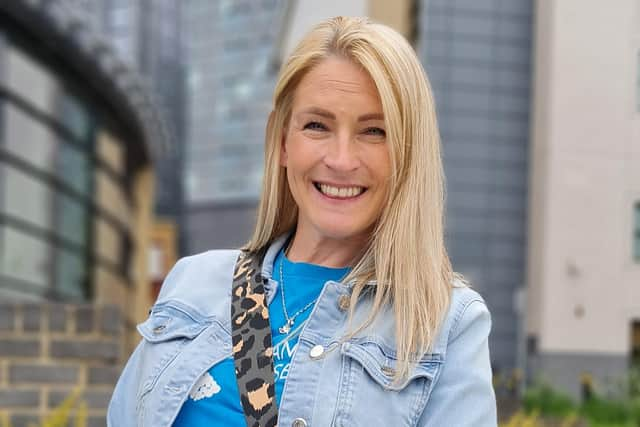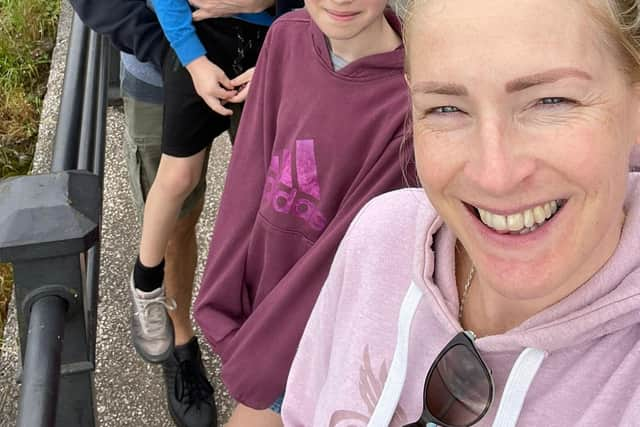Halifax cancer survivor urging people to support new Cancer Research UK fundraising campaign
and live on Freeview channel 276
Kirsty Mott, 44, is urging people to support a new campaign that shines a light on the invaluable impact that cancer breakthroughs have on the lives of people like her.
Kirsty’s call comes as data released by Cancer Research UK reveals around 1.2 million deaths have been avoided in the UK since the mid-1980s, due to advances in cancer prevention, diagnosis and treatment.
Advertisement
Hide AdAdvertisement
Hide AdOver the last four decades, UK cancer mortality rates have fallen by around a quarter, after peaking in 1985 for men and 1989 for women. Had rates stayed the same, around it is estimated that around 99,500 more lives would have been lost in Yorkshire and The Humber.


Kirsty, who’s mum, Maureen Mallon, has survived breast cancer, believes she owes both their lives to treatments and drugs that Cancer Research UK helped to develop.
Now she is backing the charity’s ‘Together We Are Beating Cancer’ campaign to help ensure life-saving progress like this continues.
The awareness and fundraising drive, that includes billboards and posters displayed across Yorkshire, highlights the heartwarming moments - from big birthdays and anniversary celebrations, to quality time with loved ones – being made possible for people affected by cancer, right now.
Advertisement
Hide AdAdvertisement
Hide AdNow with no sign of active cancer and only 8 months of maintenance immunotherapy treatment left to have, Kirsty has been living life to the full. She has been making more memories with children Grace, 12, Luke, 6 and husband Tom, 43, and enjoying a new job as the engineering senior risk manager with the chief technology office at Lloyds Banking Group.


Reflecting on her experience, she said: “The number of lives that have been saved in the region shows the immense power of research and I know this better than most. Research into better treatments has given me the greatest gift - more time with my loved ones. I got back in the gym, saw my youngest start primary and eldest start high school and got the job of my dreams – all during cancer my treatment. And my mum got to be by my side to share all those moments with me too.”
Kirsty was a fit and healthy mum of two, working full time in technology while still managing to train five times a week at the gym. But in September 2021 she was diagnosed with Non-Hodgkin Lymphoma - a cancer of the lymphatic system.
Early in 2020 Kirsty, who lives in Copley, started feeling gradually unwell and then found lumps in her groin, but was told there was nothing to be worried about. However, things started to get worse over the following months and well into 2021.
Advertisement
Hide AdAdvertisement
Hide AdShe suffered night sweats, bloating in her stomach, symptoms of IBS and the feeling there was something in the back of her throat when swallowing. By September 2021, she knew something more serious must be going on and that she had to go back to her GP.
This time the doctor could see her swollen stomach and feel a mass in her abdomen, so referred her to Calderdale Hospital.
There, an ultrasound followed by a CT scan showed it to be a 20 cm by 10cm mass which, along with abnormalities in her groin and near her bowel, were all consistent with lymphoma.
It was then confirmed to be advanced stage 4 Non-Hodgkin Lymphoma.
Advertisement
Hide AdAdvertisement
Hide AdKirsty said: “The diagnosis knocked me sideways. I was told the cancer was in my liver, spleen and ribs, and the mass in my abdomen was the reason I’d felt so bloated and had digestive problems. It was everywhere except my head, arms and legs. It was a huge shock to be diagnosed with lymphoma as I had always assumed that if I was going to get cancer, it would be breast cancer, just like my mum.”
Further tests showed Kirsty had a kind of non-Hodgkin called follicular lymphoma, which develops when the body makes abnormal B lymphocytes, a type of white blood cell that normally helps people fight infections. Follicular lymphoma is the most common type of low-grade lymphoma, mainly affecting adults over the age of 60, with around 2,600 people diagnosed each year in the UK.
“They explained that my cancer was not curable, but the good news was that research had made it highly treatable. I would first need six months of chemotherapy, not the kind that would make me lose my hair, and wouldn’t need surgery or radiotherapy. But would then need two years of maintenance immunotherapy treatment to follow. It was a game changer for me to know there was a clear and positive plan, but it was still very scary.
“My husband Tom and my family were so supportive and kept me going. I told my daughter Grace I had cancer, but not my then 4-year-old son. She asked me if I was going to die. I told her no. Grace checked in with me with hugs, especially on the days I didn’t feel so well, and was always the first to celebrate with me when my scan results came back good.”
Advertisement
Hide AdAdvertisement
Hide AdKirsty’s treatment started on 1 November 2021 with six months of a combination of the chemotherapy drug bendamustine and immunotherapy drug rituximab - both of which Cancer Research UK played a part in developing.
Bendamustine is an alkylating agent which works by interfering with the DNA in cancer cells, stopping them dividing into 2 new cells so the cancer can’t grow. Rituximab is a type of immunotherapy. It is a targeted cancer drug called a monoclonal antibody which looks for certain proteins on the surface of cancer cells. Rituximab targets a protein called CD20, which is found on white blood cells called B cells and works by attaching itself to all the CD20 proteins it finds. Then the cells of the immune system pick out the marked cells and kill them.
Kirsty added: “I had a scan in January 2022 which showed a dramatically positive response to my treatment – and the doctors were astounded. My last scan in May this year showed there were no signs of active cancer - and I am now in remission. I just have 8 months of treatment left – an injection of Rituximab every 8 weeks – and then that will be it, just regular scans and check-ups to keep an eye on me.”
She said: “I’m so grateful for the treatment that has given me back my life, meaning I get to enjoy all the incredible things – big and small - I feared I’d never get to see or do. But sadly, not everyone diagnosed with cancer will reach key milestones – and that’s why Cancer Research UK’s work is so vital.
Advertisement
Hide AdAdvertisement
Hide Ad“I’ve always been a supporter of the charity as my mum Maureen had beaten breast cancer twice, the first time when I was seven and the second when I was 18.
“So, I already knew that funds raised for Cancer Research UK would help find new cures and treatments. I’ve done Race for Life, Pretty Muddy and all kinds of other fundraising activities. I even took on the 100 squats a day challenge, which I started on the first day of my chemo, because I felt it would give me an opportunity to find something good out of a pretty rubbish situation. It was a goal to achieve each day, something else to focus on other than what was happening to my body. And I even managed to raise over £5,130 by doing it!
“I believe I wouldn’t be here without the scientists who strive to find new ways to outsmart cancer and the incredible fundraisers who make it all possible. So, now I’m determined to do what I can to show my support. I hope I can inspire people across Yorkshire to do the same. They could help bring hope and joy to more families like mine.”
Last year, Cancer Research UK spent over £5 million in Yorkshire on some of the UK’s leading scientific and clinical research.
Advertisement
Hide AdAdvertisement
Hide AdFrom pioneering some of the first chemotherapies, to the development of advanced, targeted treatments and immunotherapy, the charity’s research has played a role in around half of the world’s essential cancer drugs. In England alone, three out of four people who receive cancer drugs on the NHS are receiving treatments linked to the charity.
Cancer Research UK spokesperson for Yorkshire, Nicki Embleton, said: “Thanks to the generosity and commitment of our supporters, together, we are beating cancer.
“Our research breakthroughs mean every day, people are being diagnosed earlier, have access to kinder and more effective treatments, and some cancers are prevented completely. As our new campaign shows, this all adds up to more moments with the people we love – and we’re grateful to Kirsty for sharing her own experience.
“But around 32,800 people are still diagnosed with cancer every year in Yorkshire and The Humber. We’re working towards a world where everyone can live longer, better lives free from the fear of cancer and that’s why we’re calling on people across Yorkshire to help us go further and faster in the fight against the disease.
Advertisement
Hide AdAdvertisement
Hide Ad“By donating, fundraising, taking part in one of our Shine Night Walks, or volunteering at our shops, they could fund new discoveries that will help more people reach the life-changing moment when their doctor says: ‘It’s gone.’”
You can donate now at cruk.org/donate.